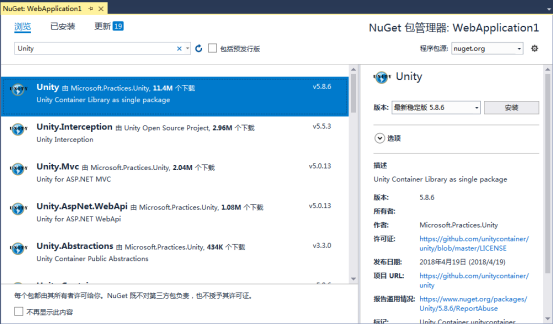为什么有这篇文章
最近在学ASP.NET MVC项目中使用Ioc,选用了Unity作为依赖注入的容器组件,在网上找了相关的文章简单实现了依赖注入,但想用文件配置的方式进行容器注入的注册,发现相关的文章实现的方式不适用,因为网上的文章大多是使用Unity 4.0.1的版本,而目前最新的Unity版本是5.8.6,使用配置进行容器注入的代码已然不同。
Ioc和Unity
IOC(Inversion of Control),即“控制反转”,是一种设计思想。有了IoC后,把创建和查找依赖对象的控制权交给了容器,由容器进行注入组合对象,所以对象与对象之间是松散耦合,这样也方便测试,利于功能复用,更重要的是使得程序的整个体系结构变得非常灵活。
Unity是微软Patterns & Practices 部门开发的一个轻量级的依赖注入容器。
代码准备
新建一个MVC项目,使用默认命名WebApplication1。在Model中新建下面3个类:
public class User
{
public int Id { get; set; }
public string UserName { get; set; }
public string Password { get; set; }
public string Email { get; set; }
}public interface IUserDao
{
List<User> GetAllUsers();
}public class EFUserDao : IUserDao
{ public List<User> GetAllUsers()
{
List<User> list = new List<User>(); //使用EF从数据库中读取数据...
return list;
}
}
using WebApplication1.Models;public class HomeController : Controller
{ public ActionResult Index()
{
IUserDao dao = new EFUserDao();
var list = dao.GetAllUsers(); //do something...
return View();
}
}以上代码主要实现从数据库中获取用户列表数据到控制器中。
使用Unity
在项目引用上右击,管理Nuget程序包,搜索到Unity并安装。

HomeController中代码改动
using WebApplication1.Models;using Unity;public class HomeController : Controller
{ public ActionResult Index()
{
IUnityContainer container = new UnityContainer();
container.RegisterType<IUserDao, EFUserDao>();
var dao = container.Resolve<IUserDao>();
var list = dao.GetAllUsers(); //do something...
return View();
}
}上面代码先声明一个Unity的容器,然后注册所需要的对象,最后调用。
按上面的方式,每次使用GetAllUsers()前都需要声明下,这里应该封装下。Unity在ASP.NET MVC中的使用已经将代码封装好了。
ASP.NET MVC使用Unity
使用Nuget安装Unity.MVC。

安装完成后会在~/App_Start/目录下自动生成UnityMvcActivator.cs和UnityConfig.cs文件。
打开UnityConfig文件,修改RegisterTypes()方法的代码
public static void RegisterTypes(IUnityContainer container)
{
// NOTE: To load from web.config uncomment the line below.
// Make sure to add a Unity.Configuration to the using statements.
// container.LoadConfiguration();
// TODO: Register your type's mappings here.
container.RegisterType<IUserDao, EFUserDao>();
}注意引用
using WebApplication1.Models;
修改HomeController代码(使用构造函数注入)
public class HomeController : Controller
{
IUserDao _iUserDao;
public HomeController(IUserDao iUserDao)
{
this._iUserDao = iUserDao;
}
public ActionResult Index()
{
var list = _iUserDao.GetAllUsers(); //do something...
return View();
}
}此方式是将依赖注入写在了代码中。然而并不灵活,每添加一组类,都要在UnityConfig中进行注册并编译一遍代码。我们更需要的是在配置文件中注册类型。
使用配置文件
修改UnityConfig文件中RegisterTypes()方法的代码:
public static void RegisterTypes(IUnityContainer container)
{
// NOTE: To load from web.config uncomment the line below.
// Make sure to add a Unity.Configuration to the using statements.
container.LoadConfiguration();
// TODO: Register your type's mappings here.
// container.RegisterType<IUserDao, EFUserDao>();
}需要引用
using Microsoft.Practices.Unity.Configuration;
更改Web.Config的配置:
<?xml version="1.0" encoding="utf-8"?><configuration>
<configSections> <section name="unity" type="Microsoft.Practices.Unity.Configuration.UnityConfigurationSection, Unity.Configuration"/> </configSections> <unity> <containers> <container> <types> <type type="WebApplication1.Models.IUserDao, WebApplication1" mapTo="WebApplication1.Models.EFUserDao, WebApplication1" /> </types> </container> </containers> </unity> ......</configuration>
运行站点,成功获取用户列表数据。
扩展
如果需求更改,要换用ADO.NET来操作数据库,只要建一个SQLUserDao的类,继承自IUserDao,然后将配置文件中的注册类型修改即可
<type type="WebApplication1.Models.IUserDao, WebApplication1" mapTo="WebApplication1.Models.SQLUserDao, WebApplication1" />
笔者使用的是VS2017进行操作。
